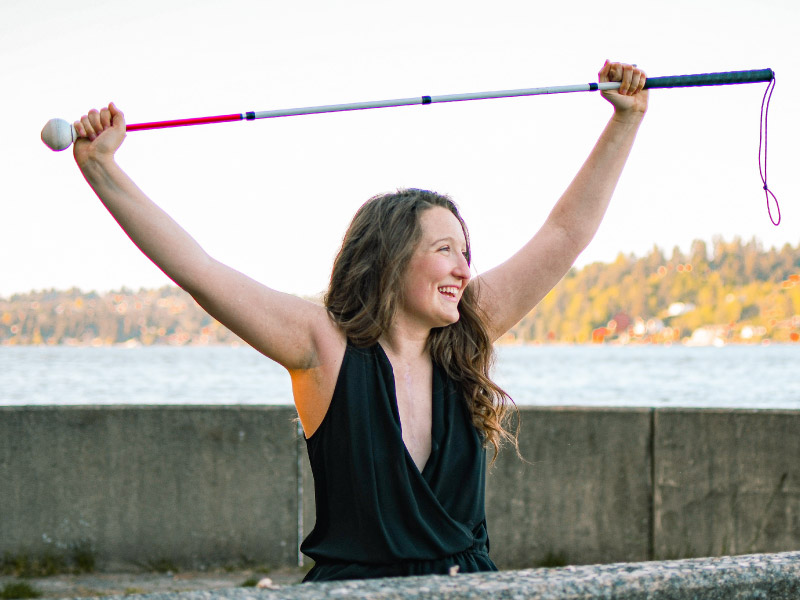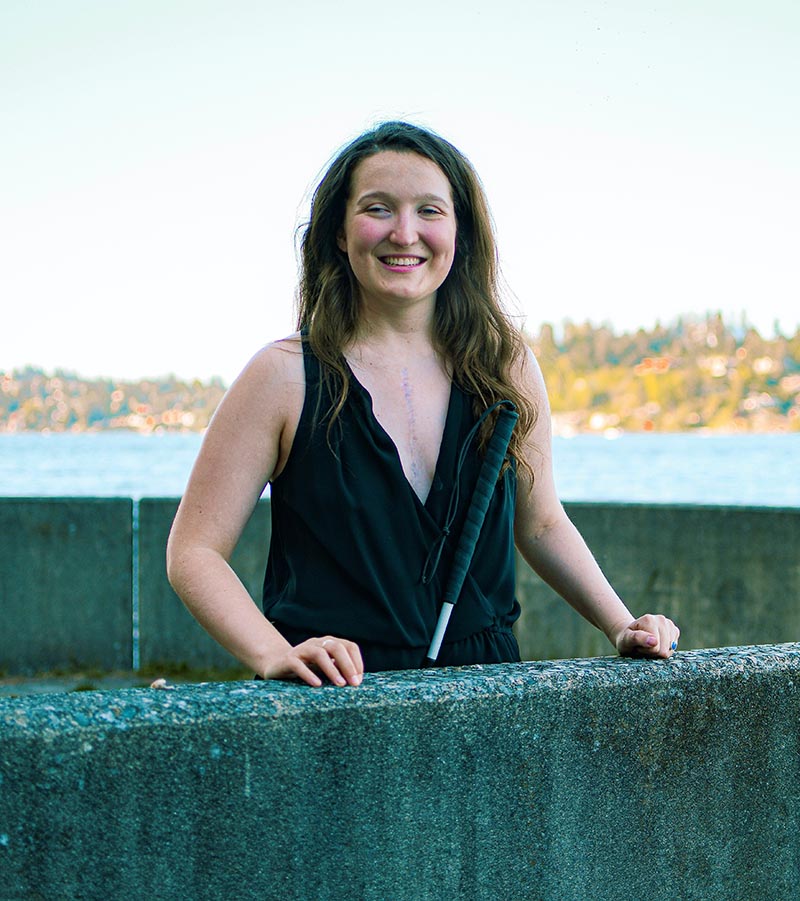Stroke, blindness, a heart transplant – and a can-do spirit
By Leslie Barker, American Heart Association News

Hana Hooper went to college with dreams of becoming a veterinarian. She aspired to boost her knowledge of biology and intended to amplify her interest in art.
She was 18, and her future was aflame with potential.
"We thought she'd go and have a normal college experience," said her mother, Ali.
Five years later, Hana has shown moxie in circumstances that have been anything but normal. After surviving a stroke, going blind and waking from a months-long coma – all precipitated by a freshman-year diagnosis of dilated cardiomyopathy, a genetic and previously undetected heart issue – she continues to take on the world.
She has gone rock climbing, ridden horses, hiked 25 miles on the Pacific Coast Trail, taken pottery classes, and (before pandemic restrictions) skated for a blind ice hockey team. As a result of her illness, Hana's sisters, Laine and Michaela, now plan a career in nursing.
Hana's unexpected journey began within weeks of starting Hamilton College in upstate New York. She'd been feeling a little run down, but she asked herself what college freshman hasn't felt that way? Then came an excruciating headache, which emergency room doctors initially diagnosed as a migraine.
But after being sent home from the hospital, she texted her mother that she didn't have enough breath to climb two flights of stairs to her math class. She was having trouble seeing letters when she tried to text.
"I flew out and went to the clinic on campus," Ali said. The nurse practitioner there suggested they go to a children's hospital in Syracuse.
On the way there, Hana recalled, "Mom kept checking to see if I was breathing."
Then, when Hana was about to be discharged from that hospital with what doctors thought was a virus, Ali pointed out that her daughter's heart rate hadn't gone down.
"At what point," she asked them, "do we worry?"
Immediately, as it turned out.
An echocardiogram showed dilated cardiomyopathy, which stretches out the heart muscle, weakening its ability to pump blood. Hana was immediately admitted to the intensive care unit. Two weeks later, doctors told the family – all of whom had gathered in the ICU to be with her – that Hana needed to go to a medical center that specializes in heart failure and heart transplant.
A medical flight took her home to the state of Washington, where she spent two more weeks in a hospital. It became a cycle: home, hospital, home, hospital.
Finally, doctors acknowledged that medications weren't making Hana better. She was put on the heart transplant list.
"That was the first time I've ever seen my dad cry," Hana said, "and the first time I was really afraid of dying."
By January 2017, Hana's health was getting worse. Having Type O blood was another roadblock. While it is considered a universal donor type, people with that blood type can only receive organs from a Type O donor.
Doctors didn't think she'd survive without a transplant, so they recommended implanting a left ventricular assist device, called an LVAD, to help the heart pump until they found a donor.
During the surgery, Hana had several strokes. She went into a semi-coma for three months. She spent the next three months slowly recovering, eventually advancing to rehab.
"Initially I couldn't even move my fingers and toes," she said.
Only when she was finally home, and her cognitive abilities began improving, did Hana even realize she was blind. And, as if the family needed more roadblocks, they were told Hana's strokes would keep her off the transplant list, and that she probably had six months to two years to live.
That was when her family showed its mettle more than ever.
"We decided we'd live every day as if it were her last," Ali said, "because we didn't know how long we'd have with her."
"There was a lot of 'why me?'" Hana said. "But I have an amazing family who helped me deal with it. My mom's attitude is pretty positive: 'If you're going to live with this, live a good life.'"
Hana got involved with the Outdoors for All Foundation, a nonprofit that organizes and stresses the importance of outdoor activities for children and adults with disabilities. She learned to rock climb and to sit ski, which is a way for people to snow ski while sitting.
Then came yet another setback: Hana's LVAD began to malfunction. It had to come out.
Doctors were split over whether to rely on her heart or to seek a transplant. Additional opinions swayed them toward transplant. The family moved to Los Angeles in hopes of getting her new heart at Cedars-Sinai, the hospital where the most adult heart transplants in the world are performed.
Six months later, they got the call. Hana received her new heart on Sept. 16, 2018.

To honor the memory of her 25-year-old donor, Hana, her sister Laine, her mom and her mom's brother Tim backpacked 25 miles on the Pacific Coast Trail last summer. It took five days. Hana carried her own pack and used ski poles to help her feel her way along.
"We were in crisis mode for four years," Ali said. "Just now, in the past year, we've moved into chronic. We still try to remember to be grateful and not sweat the small stuff. Things don't go the way you think they're gonna go, so you find a way to keep going. One foot in front of the other."
Hana still has spatial awareness and attention issues, and she receives speech therapy. She takes 21 pills a day. But, she said, she surprises herself with how well she's dealt with everything.
"Sure, I get down," Hana said, "and then I think about all the positives in my life. I have a great family and amazing sisters. I have food on the table ... and I realize I have it pretty good."
Stories From the Heart chronicles the inspiring journeys of heart disease and stroke survivors, caregivers and advocates.
If you have questions or comments about this story, please email [email protected].





